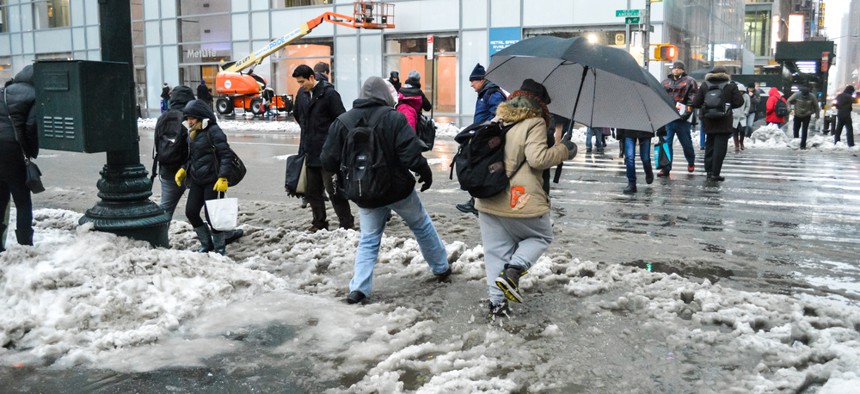
Andrew F. Kazmierski / Shutterstock.com file photo
Bad Weather: Better for Work, Terrible for Everything Else
Now is the winter of our productivity.
Talking about the weather used to be drudgery saved for only the most boring acquaintances. But in the age of temperature selfies and record snow, winter'spopularity on the Internet seems to thrive in spite of the season's toll on our minds (and bodies).
Winter and the snowstorms that come with it have traditionally been associated with a drop in economic output, with some estimates in the billions annually for the U.S. alone. But productivity studies hum a different tune for office workers: When the weather's bad outside, workers are more productive at their jobs inside.
Researchers Jooa Julia Lee, Francesca Gino, and Bradley Staats looked at how weather affects worker productivity at a Japanese bank, online, and in the lab. They hypothesized that good weather is distracting because "attractive outdoor options is a form of task-unrelated thinking that serves as a cognitive distraction that shifts workers’ attention away from the task at hand." In other words, when a worker is thinking about all the things they could be doing on a nice summer day instead of being stuck at the office, they're not focused on work.
In the experiment at the Japanese bank, the researchers measured how long it took for workers to complete data-entry tasks. The building where this experiment took place had windows, through which the bank workers could see the weather outside. They found that for every inch of rain that fell, there was a 1.3 percent decrease in completion time for these tasks. Online, 329 participants provided their zip codes so the researchers could match weather data to their surveys. They were asked to think about the weather that day, then to identify spelling errors in an essay. Again, the researchers found that bad weather was associated with increased speed and accuracy.
This is in addition to prior research indicating that American workers actually spend more time at work on rainy days, and that summer—and pleasant weather in general—has a way of making our brains lazy.
Research also shows another type of workers affected by the weather: stockbrokers. One study looked at whether there was a link between weather, mood, and investors' appetites for risk. It found that sunny days in New York were positively correlated with Dow stock prices between 1948 to 2010—the weather effects were most pronounced in the 1990s, when, researchers explain, many non-professional investors who were prone to psychological biases (like taking more risks on a sunny mood) entered the market.
The researchers of the rainy day productivity study suggested that managers can take advantage of these findings by assigning "easier" work on sunny days, and "harder" work on gloomy days, when workers are more likely to be focused. Also, keep workers warm in the winter, and cool in the summer: One study found that 71º Fahrenheit was the optimal office temperature for productivity. Temperatures higher than that resulted in a steady drop in productivity, and temperatures lower than 71° Fahrenheit led to drops in performance as well.
These studies may suggest that the Midwest and Northeast's brutal winters actually bring some economic benefits, albeit ones that are harder to observe. But as the climate itself becomes more and more extreme, productivity could be impacted in an even bigger way: An NBER study on how climate change could potentially affect productivity found that productivity declines 1.7 percent with every degree above 15° Celsius in daily average temperature. And while snow and rain might make workers a bit more efficient, massive 100-year storms likely wouldn't be as much of a boon to productivity.
(Image via Andrew F. Kazmierski / Shutterstock.com )






